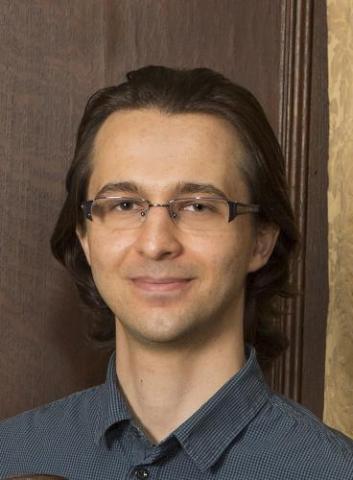
Stefan received the 2018 Yale Graduate School Disciplinary Outreach Service Award for his actively contribution to many outreach activities at Yale, including the recent Engineering Day. He is today featured in our member spotlight.
Stefan discovered his interest in sciences in high school in Bulgaria, his home country, where he found his teachers excelled at nurturing students interest in science. He then studied as an undergrad in the French education system. He did his Classes Préparatoires (2-year preparation school) at Lycée Louis-le-Grand in Paris with a very intense curriculum covering physics, chemistry, and math, giving him good foundations on his way to the second stage of this type of undergrad education (Grandes Écoles, 3-year Master-equivalent schools), but leaving him without any space for creative inquiry the way liberal education in the States does. He joined École Normale Supérieure (ENS) in Lyon in their Physics program, where he finally got opportunity to be more creative in his studies. He got particularly interested in Quantum Information during his last year at ENS, as he was learning more about computational complexity and how it relates to the real world. He was particularly fascinated how the impossibility of solving an abstract math problem can create a limit on what a related real-world physics law is permitted to look like. Quantum information seemed like a particularly fruitful related area, and he joined Liang Jiang lab as a graduate student in 2014.
The overreaching goal of his research, and by extend for most of YQI, is to create ways for the reliable control of quantum systems, so that they can be used as the building blocks of quantum hardware. He has a couple of small projects surrounding this topic, from designing control schemes to designing methods for detecting and correcting errors that might randomly occur in the hardware. However, for the last couple of weeks Stefan has been focusing mainly on methods for the calibration of such hardware. “When you build a piece of machinery, quantum or not, you need to also create a detailed model of the machine, in order to be able to control it precisely. There are some interesting constraints on how precise this model can be, and I am working on improving the precision.” he says.
In practical terms, these machines would be able to make the design of new drugs and super-materials much easier. Currently, simulating the behavior of a drug or a material is infeasible, but with quantum computers it will become relatively easy. Additionally, there are some applications to parameter optimization (like searching for local or global minima of a cost function) that could be interesting, but they really do not excite him, as he does not see this a quantum leap forward! On a fundamental level, building a scalable quantum computer would be a pretty significant milestone on the way of understanding how the abstract limits of computational processing shape our world.
He is currently working on finishing quite a few of his project to be able to present a more complete picture of the current state of the art quantum setups.
Fun fact
Stefan likes horrible puns. So here is an advice for him: in a field where one monitors the elections states on trapped atoms, you really need to keep an ion them.
Favorite publication
Aaronson, S., Why philosophers should care about computational complexity, Book chapter of Computability: Turing, Godel, Church, and Beyond, pp. 261-328 2013
Latest publication
Krastanov, S., Jiang, L., Deep Neural Network Probabilistic Decoder for Stabilizer Codes, Scientific Reports, 7 (1), art. no. 11003, 2017
Most cited
Heeres, R.W., Vlastakis, B., Holland, E., Krastanov, S., Albert, V.V., Frunzio, L., Jiang, L., Schoelkopf, R.J., Cavity State Manipulation Using Photon-Number Selective Phase Gates, Physical Review Letters, 115 (3), art. no. 137002, 2015